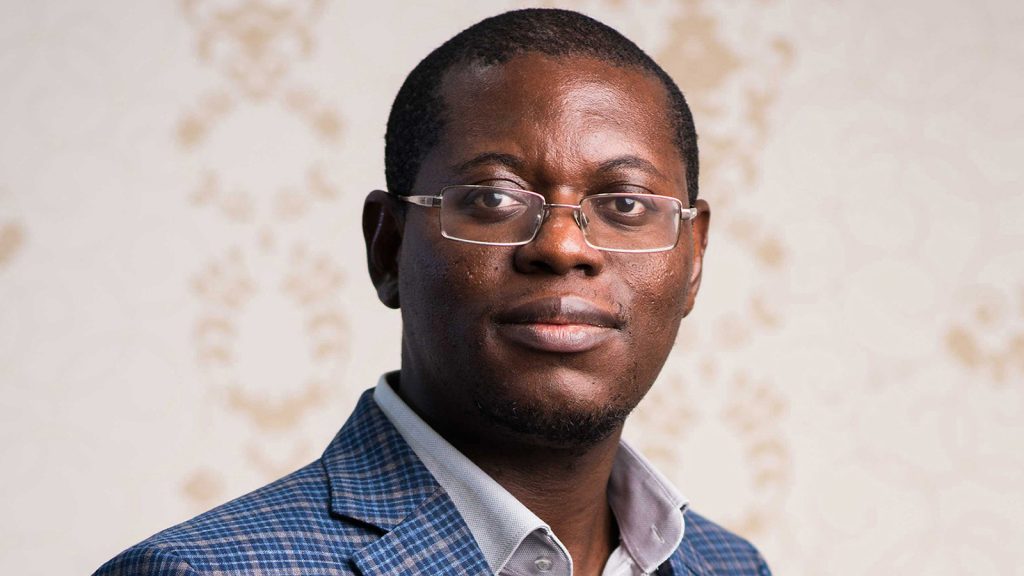We all have them. Those apps we open without thinking. Not because we need anything in particular, but because they feel… safe, in some…
How anti-counterfeit service mPedigree pivoted from organic fruit certification scheme

Award winning tech company mPedigree earlier this month received a $1.5-million investment from the Skoll Foundation after it was named as one of five winners of the 2019 Skoll Awards for Social Entrepreneurship (see this story).
The company was started by Ghanaian Bright Simons (pictured above) in 2007 and offers an anti-counterfeit product verification service.
mPedigree’s service enables users, in real-time, by scanning or typing in a code on their phone to verify whether a product is genuine or counterfeit. As it does this, the platform notifies manufactures of instances where counterfeit products have been picked up.
But it wasn’t always like this. The company previously offered a certification service for organically grown fruits and vegetables from Africa. It only took off after pivoting from this previous offering.
mPedigree was founded in 2007 and now operates across 12 countries around the world
The tech company’s head of external relations Daniel Kwakye told Ventureburn in a series of emails this month that the platform was born out of a failed 2007 organic fruit certification scheme called Wospro, short for Wiki-farming and open-source processing.
Wospro, which was incorporated in the US and based out of Ghana, aimed to allow both supermarkets and consumers to connect directly to farms online in order to see where their food was grown and by whom.
Wospro, Kwakye explained, failed because Simons and his team at the time had limited understanding of small-scale farming in Africa.
“We thought we were in ‘agribusiness’ and since we were researchers we overestimated the ease with which our understanding of agriculture in an academic sense could transfer to a guts-feel connection with smallholder farmers,” said Kwakye.
In addition, Wospro had no partners with whom to share risks with and hunt opportunities together. Kwakye said farmers did not trust the initiative enough and wanted to be paid to adopt any tool the startup had to offer.
“Since we couldn’t rely on in-kind investments to reduce the barriers to a minimally viable platform, we just couldn’t put together a barebones product that could generate enough revenue to build momentum,” he added. This, Kwakye said, left the initiative stuck in “pilot-zombie land”.
Organic certification tech repurposed
With Wospro’s failure, Simons — who is an Ashoka Fellow and an executive of research and advocacy think tank IMANI — and his team then set up a non-profit that initially focused on bringing major tech corporations like HP to work with regulators and consumer associations to address counterfeiting.
Kwakye said the precise trigger was a Ghanaian documentary on how dozens of children had been maimed or killed because of an incident in Nigeria involving counterfeit paediatric medicine.
It then dawned on Simons that the problem of counterfeit medicines was just another facet of how to maintain trust in the supply chain that had triggered work on the organic certification idea. This then led to the certification tech being repurposed as a new platform.
From 2013 mPedigree began focusing on building a commercial model and attained the identity of a fully-fledged tech startup. The company then partnered with global tech consultancy ThoughtWorks.
Kwakye said it is through such networks and partnerships that mPedigree built from scratch what it considers to be one of the world’s most nimble and creative tech teams.
“Nowadays, mPedigree builds its end-to-end platforms across a wide array of domains, from high-speed transactions processing to machine learning, predominantly in-house,” he pointed out.
Initially operating as a non-profit, Kwakye said mPedigree was in its early days financed through partnerships with firms like HP as well as fellowship stipends from Ashoka.
From 2013 as the company grew its commercial activities Simons re-invested all of the revenue it generated back into its operations.
The company has been largely self-funded from core operations, and that the firm has also used strategic supplier credit and major consulting income for specific projects in various countries to grow its footprint significantly.
Global firm
mPedigree currently operates in 12 countries, including Ghana, Egypt, Kenya, Uganda, Tanzania, Zambia, India, Rwanda, China, as well as the Netherlands and Switzerland where the company carries out its client support and legal operations.
Kwakye said mPedigree is incorporated in four other countries which he would not name, saying the company is operating in “stealth mode” in these countries because strategic business reasons.
Yet it is not clear to all, where the firm is based.
Kwakye said the company is a new breed of tech-enabled multinational startup that is “very confederational” in character. mPedigree’s main logistics hub is in Mumbai, India and a marketing presence in Bangalore.
This, while it has growing client-services center focus in Amsterdam — which the startup has plans to expand to serve as a major support hub for customers across multiple time zones and jurisdictions — a primary pharma or ehealth focus in Nigeria, an agro-innovation centre in Nairobi as well as an inter-governmental initiative in Zambia.
In addition, the startup has an emerging research and development programme in Cambridge in the US, while it signed its first client in Ghana through a pilot deal with Efpack in Ghana.
“In these circumstances, one has to stick with the ’emerging multinational’ tag rather than be overly concrete on where we are based,” reasoned Kwakye.
He explained that the reason for the firm’s dispersion is that mPedigree’s operations mirror the complex and fragmented supply chains of major consumables today.
“Some of our largest clients have factories on different continents where we have to integrate our solutions,” he added.
Kwakye would not disclose just how many people the company employs, he however revealed that a “major proportion” of mPedigree’s workforce is managed by its fulfillment partners.
‘Served over 100 million beneficiaries’
From its first pilot deal in 2007 in Ghana with Efpack and a 2010 deal with May & Baker Nigeria, mPedigree now works with some of the worlds biggest pharmaceutical companies, including Sanofi and AstraZeneca.
In Nigeria, by law, every antimalarial and antibiotic made in or shipped to the country must have traceability. Kwakye said mPedigree has “for a while now” supported the majority of traceability transactions.
“That’s millions of Nigerians all over the country every week checking their medicines. For elderly people suffering from chronic ailments, the engagement with our platform is obviously much more intense, perhaps somewhat less so for younger people,” he pointed out.
The startup also provides agro-traceability services across East Africa. In Kenya, seed packets meant for retail must by law have traceability, which mPedigree provides.
“Cumulatively, we have served over 100 million beneficiaries when all of these are aggregated,” said Kwakye.
The startup is currently rolling out across Southern and Eastern Africa, starting with integrating e-regulation software into core regulation in key agricultural countries like Zambia. Kwakye said the firm has five million farmers in view over the coming year.
“Recent consumer outreach programs with the likes of Unilever, Nestle and PZ Cussons involved millions of consumers in Ghana. Generally, the scale is massive because we are dealing with consumables here,” he explained.
‘Model hard to run’
The company’s business model, Kwakye said, is hard to run as the firm has to handle operations that in more developed communities others should be handling.
“Since we are committed to a systems-level cleanup of supply chains and consider ourselves as being in the trust rather than simply anti-counterfeiting industry we cannot do things otherwise,” said Kwakye.
At the same time as the startup is supplying e-regulation tools to government, it also has to grapple with the user interface on its phone apps so that consumers can still get benefits from its system. This, even if a manufacturer of a product has not yet signed on to mPedigree’s services.
This year, the startup plans to continue to enrich and strengthen its analytics suites and machine learning capabilities. Kwakye said the fresh investment by Skoll of unrestricted funding should be very useful.
He adds that the race is on to perfect mPedigree’s predictive analytics product by successfully predicting a major counterfeiting incident before it happens using data triangulation.
Kwakye believes the company is pioneering the “internet of dumb things” through its Koldchain spin-off — which he said is currently being incubated at the Harvard Innovation Lab.
Koldchain is experimenting with polymers with dumb or inert sensors, as well as with machine learning algorithms.
The idea is that these will serve as an alternative to expensive radio-frequency identification (RFID) and electro-mechanical and interconnect devices (EMID) active or smart sensors in use in supply chains.
Said Kwakye: “There are a lot of exciting activities ongoing in mPedigree locations around the world, and we are very confident some of the outcomes will considerably change perceptions of what is possible in African and Global South startups”.
Read more: Ghanaian healthtech startup mPharma wins $1.5m at 2019 Skoll Awards
Featured image: mPedigree founder Bright Simons (Supplied)


